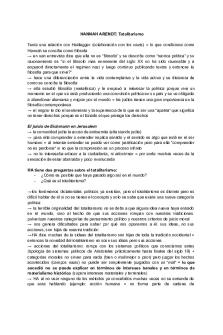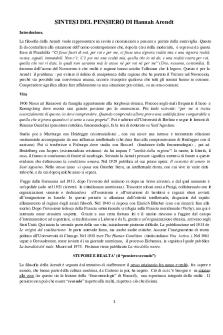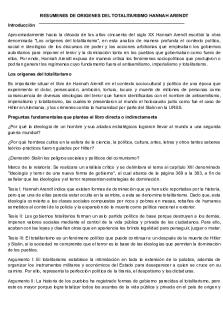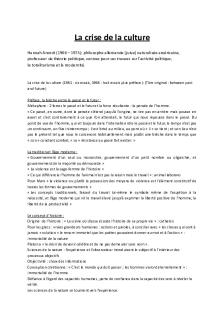Hannah Arendt - Conflict and peacebuilding PDF

| Title | Hannah Arendt - Conflict and peacebuilding |
|---|---|
| Course | Conflict and Peacebuilding |
| Institution | The London School of Economics and Political Science |
| Pages | 2 |
| File Size | 80.7 KB |
| File Type | |
| Total Downloads | 79 |
| Total Views | 152 |
Summary
Conflict and peacebuilding...
Description
HANNAH ARENDT’S CRITIQUE OF VIOLENCE (summary) Arendt’s engagement with these themes formed one of the contexts within which she made her pronouncements on the need to justify violence instrumentally. In moral terms, violence, Arendt writes, ‘can be justifiable, but it never will be legitimate. Its justification loses in plausibility the farther its intended end recedes into the future’ (Arendt, 1969: 52). Similarly, the rationality of violence is determined by its conduciveness to achieving just ends: ‘Violence, being instrumental by nature’, she writes, ‘is rational to the extent that it is effective in reaching the end that must justify it. And since when we act we never know with any certainty the eventual consequences of what we are doing, violence can remain rational only if it pursues short- term goals’ (Arendt, 1969: 79). As the correct criterion for justification, Arendt contrasts instrumental- ity with two principles invoked erroneously in revolutionary literature. First, ‘legitimacy’ theories falsely invoke the subjective origins of violence as vindi- cation of its justice. For Arendt, legitimacy is something that properly belongs to power and the solidarities through which it appears in the world: ‘Power’ which ‘springs up whenever people get together and act in concert . . . derives its legitimacy from the initial getting together rather than from any action that then may follow.’ Thus, a challenge to legitimacy will properly be met with ‘an appeal to the past’. By contrast, the goal-orientated nature of the violent instrument seeks validation from ‘an end that lies in the future’, i.e. what Arendt calls ‘justification’ (Arendt, 1969: 52). The second error is to treat violence as valuable in and of itself, without reference either to origins or ends, hence Arendt’s remark in the introduction to On Revolution: A theory of war or a theory of revolution . . . can only deal with the justification of violence because the justification constitutes itpolitical limitation; if, instead, it arrives at a glorification or justification of violence as such, it is no longer political but antipolitical. (Arendt, 1990: 19) Instrumental justification thus appears as a key criterion for Arendt in distinguishing her account of permissible violence from the theories of Sorel, Fanon and others. Along with Vilfredo Pareto, Sorel and Fanon are among the few theorists who ‘glorified violence for violence’s sake’, Arendt (1969: 65) writes (though Sartre’s idea that violence can be recreative of the human being is included in the sweep of this argument). And legitimacy and necessity contributed to the arguments through which their valorization of violence as good in itself was promoted (Arendt, 1969; Finlay, 2006). There are, however, some important qualifications to Arendt’s endorse- ment of instrumental justifications in On Violence. First of all, while justifi- cation is to be preferred to approaches emphasizing ‘legitimacy’, Arendt is emphatic that the
relationship between means and ends is too uncertain in important respects for violence to become a safe and reliable instrument in politics. There are two difficulties: first, violence is inherently arbitrary and unpredictable in its results as some of the statements quoted above empha- size. Even without the means of violence, action in general is unpredictable. But while uncoerced and non-coercive political action is a good in itself, in Arendt’s view, violence can be valorized only by its attainment of just ends; unpredictability therefore stands as an important limit on its justifiability. Secondly, violence, Arendt maintains, is ‘generative’, as Patricia Owens puts it. Far from slavishly pursuing the ends in whose services it has been enlisted, violence tends to overwhelm its putative ends, undermining them, rendering them impossible, or displacing them by creating conditions giving rise to new ends (Arendt, 1969: 10, 54; Owens, 2007: 57). From both problems Arendt concludes that the most likely result of using violence is that it will lead to more violence (Arendt, 1969: 80). If Sorel’s Reflections on Violence do tend to glorify violence, they do so in a way that might appear justified by the political ends that theatrical violence can potentially help bring about. It’s not, therefore, entirely clear that Arendt’s view as stated in On Violence excludes Sorel’s revolutionary violence from its permissive reach. This is arguably true for Fanon too. In The Wretched of the Earth, violence is the only antidote to the crushing of the subject’s agency by the unmediated violence of colonialism. But the utility of violence isn’t primarily seen in its ability to overwhelm the armed forces of colonial empire. Instead, it is a function of its therapeutic promise as the participation of empire’s victims in counter-violence helps them to claim back their dignity and to heal the psychological wounds inflicted by the settlers. Again for Fanon as for Sorel it is the image of violent confrontation at least as much as the tactical effectiveness of violence in real battle that effects a change in the political situation. But it is the effect of change, among other things, that gives justification to bloodshed: as with Sorel, the violence reflected in Fanon’s Wretched of the Earth may be justified at least in part by instrumentality (Fanon, 1967)....
Similar Free PDFs

Hannah Arendt - resumen libro
- 2 Pages
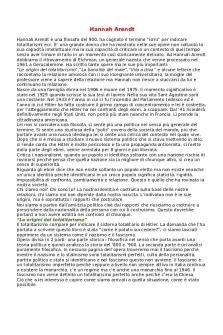
Hannah Arendt riassunto storia
- 6 Pages
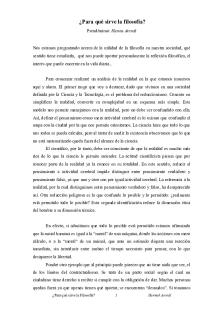
Hannah arendt - asdfg
- 4 Pages

We refugees – Hannah Arendt
- 4 Pages
Popular Institutions
- Tinajero National High School - Annex
- Politeknik Caltex Riau
- Yokohama City University
- SGT University
- University of Al-Qadisiyah
- Divine Word College of Vigan
- Techniek College Rotterdam
- Universidade de Santiago
- Universiti Teknologi MARA Cawangan Johor Kampus Pasir Gudang
- Poltekkes Kemenkes Yogyakarta
- Baguio City National High School
- Colegio san marcos
- preparatoria uno
- Centro de Bachillerato Tecnológico Industrial y de Servicios No. 107
- Dalian Maritime University
- Quang Trung Secondary School
- Colegio Tecnológico en Informática
- Corporación Regional de Educación Superior
- Grupo CEDVA
- Dar Al Uloom University
- Centro de Estudios Preuniversitarios de la Universidad Nacional de Ingeniería
- 上智大学
- Aakash International School, Nuna Majara
- San Felipe Neri Catholic School
- Kang Chiao International School - New Taipei City
- Misamis Occidental National High School
- Institución Educativa Escuela Normal Juan Ladrilleros
- Kolehiyo ng Pantukan
- Batanes State College
- Instituto Continental
- Sekolah Menengah Kejuruan Kesehatan Kaltara (Tarakan)
- Colegio de La Inmaculada Concepcion - Cebu


